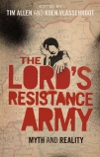With a few notable exceptions, international news reporters have been interested in telling adventure stories about their attempts to interview Kony; or have tended to concentrate on the more bizarre aspects of both the war and the peace negotiations; or focus on specific issues — such as the hundreds of children who used to migrate into Gulu …in the evenings, where they could be easily filmed and interviewed.
Few have seriously investigated how and why events have occurred.
That is Tim Allen and Koen Vlassenroot introducing The Lord’s Resistance Army: Myth and Reality, in which nineteen scholars try to combat the worst myths and misunderstandings of the war.
It’s essential reading for those interested in the war (and I say that not simply because Jeannie and I have a chapter on the experiences of abductees).
The essays are uniformly excellent, but sadly there’s not an Acholi contributor to the mix. This older volume collects some Ugandan accounts. See also my northern Uganda recommended reading list.


2 Responses
I don’t know much about the war but the description makes it obvious they’re talking (perhaps uniquely) about Invisible Children.
Do you think books about the “real” causes of the war actually contribute anything to Acholi people’s well-being? Wars and peace negotiations just jump at me as being like growth policy, the topic is important but the research isn’t of any practical use. I have a suspicion they’d help a lot more if they just paid for scholarships like IC’s NGO does.
I don’t know the details of IC’s scholarship program, but that is precisely where money ought to be spent. It’s ironic: while their NGO has good prioirities, advocacy like IC’s has led to a gross distortion of international aid policy towards former abductees and night commuters, and away from where it is most needed. IC is not alone in this badvocacy; it is the norm among international actors.
In the end, the best programs, and the ones most empowering and respectful of rural peoples is probably the government’s northern development program, NUSAF. Yet it has a bad name because most people (including the government themselves) don’t have the facts right.
But to get to your bigger question: the war narrative is important because it will drive the targeting of development assistance, national reconciliation, and the perception and identity of the Acholi in Uganda. What could matter more?